Spiritual life in political revolution
In Kiev, Gdańsk, & ancient Jerusalem, revolution changes people
Forasmuch as many have taken in hand to write of revolutions, but always about their causes, philosophies, and outcomes, historian Marci Shore has done something different. She has written about their spirituality.
The Ukrainian Night focuses on the Maidan revolution, named after Kiev's central square where citizens—hundreds of thousands of them—stayed for nights on end in often sub-zero temperatures during the winter of 2013-14.
Her book reads like the book of Acts. In both books, a large portion of a city's population spontaneously begins meeting daily in the city's central square. Living in oppressive regimes, the people in both books give themselves to alternative political communities.
In both books, these new communities attract harassment, sometimes violence, from the authorities. Many members are beaten, and some lose their lives.1
Does Acts narrate a political revolution? In popular theological writing, the use of “revolutionary” to characterize the importance of Jesus’s passion or resurrection or the opening of the church age is a commonplace. But in his commentary on the book of Acts, theologian Willie James Jennings uses the term “revolution” accurately and fully—that is, both spiritually and politically. His commentary’s opening lines signal his approach:
The book of Acts speaks of revolution. We must never forget this. It depicts life in the disrupting presence of the Spirit of God.2
In both ancient Jerusalem and in modern Kiev, the disrupted lives in political revolution were spiritually transformed.
Revolutions create public space, and public life in that space changes people.
Above: four men carrying a crucifix during the Maidan revolution. “the weight of the Maidan,” photo taken on March 7, 2014 by streetwrk.com. Used with permission.
Revolution’s early life: morality & mutual aid
The revolution’s effect in Jerusalem was immediate. Onlookers in the first hours thought Jesus’s disciples were drunk.3 They weren’t, of course. Instead, as a New Testament writer reminded those early revolutionaries later, they were “enlightened.”4
This enlightenment happened in Kiev, too. Many participants in Ukraine’s Maidan Revolution used the expression “we understood perfectly” to explain why they joined it. To Shore, the phrase “we understood perfectly” was “an affirmation of lucidity, the feeling that as of a certain moment, everything was absolutely clear.”5
As in Jerusalem, alcohol didn’t induce this enlightenment. In Kiev, despite the participation of over a million people in the Maidan from December 2013 through March 2014,6 no alcohol appeared inside the barricades forming the revolution’s perimeter. Considering Ukrainian culture in which vodka is present “all the time and everywhere,” and considering the frequent sub-zero temperatures of Kiev’s winter nights, the discipline was remarkable.7
Above: “Euromaidan,” photo taken on December 8, 2013 by teteria sonnna. Used with permission.
Poland’s experience in 1980 was similar. Historian David Ost describes Poland as “a country in revolution,” and the country felt the same onset of morality.8 Journalist Ryszard Kapuscinski chronicles conditions in two Polish cities, Gdańsk and Szczecin, in which “a new morality took control”:
No one drank, no one caused trouble, no one woke up crushed by a stupefying hangover. Crime fell to zero, aggression disappeared. People became friendly, helpful and open with one another. Total strangers suddenly felt that they needed each other.9
No one decreed an alcohol ban—or, more broadly and more to the point, no one decreed a common life—at the Maidan or in Poland. It just happened. Things just happened in Jerusalem, too:
And all those who had believed were together and had all things in common; and they began selling their property and possessions and were sharing them with all, as anyone might have need.10
Same in Kiev, according to historian Timothy Snyder:
A visitor would be surprised to find deep order amidst apparent chaos, and realize that what seemed at first like extraordinary hospitality was in fact a spontaneous welfare state. The Polish political activist Sławomir Sierakowski was duly impressed: “You walked through the Maidan and you are presented with food, clothing, a place to sleep, and medical care.”11
Above: “support,” photo taken on December 19, 2013 by streetwrk.com. Used with permission.
Acts 2:42 and four new political forms
Teaching and books accompanied the Maidan revolution’s food, clothing, and medicine, all in Kiev’s public square:
There was a library, an Open University with lectures and film screenings, and a communal upright piano painted yellow and blue. People erected tents, built bonfires, and cooked soup in iron cauldrons. Donations were abundant. Food, clothing, and medicine were distributed without charge. Volunteers cleared snow and ice.12
This tendency to organize didn’t come from any management or hierarchical structure. The organization was organic, as it is during any outbreak of mutual aid. Shore quotes Slawormir Sierakowski on the subject: “People are never as well organized as they are during a revolution.”13
These spontaneous, new ways of organizing themselves suggested to Snyder four new political forms: “the civil society, the economy of gift, the voluntary welfare state, and the Maidan friendship.”14 Kiev’s four political forms bring to mind the four famous facets of Jerusalem’s common life during its revolution: “They met constantly to hear the apostles teach and to share the common life, to break bread, and to pray.”15
Revolution removes social strata
All three revolutions were welcoming. In Poland, the pervasive principle was “mutual respect, embracing everyone without exception.”16 It’s matched by the Kiev participants’ “extraordinary hospitality” as well as by the hospitality of Jesus’s new disciples, who were “breaking bread from house to house.”
Social barriers fell, too. At the Maidan, “the homeless were integrated into the larger community for the first time” ever in Kiev. Shore reports that
The Maidan was a “laboratory of the social contract,” in one writer’s description, “a union of IT specialists from Dnipropetrovsk and a Hutsul shepherd, an Odessa mathematician and a Kiev businessman, a translator from Lviv and a Tatar peasant from Crimea.” On the Maidan—Victoria Narizhna and Ihor Petrovsky suspected—many urban men and women with doctorates were having conversations with peasants for the first time in their lives, and vice versa.17
Kiev’s interactions between professors and peasants echo the erasure of social differences that Peter suggested at the outset of Jerusalem’s revolution when he quoted the prophet Joel: “. . . even on my bondslaves, both men and women, I will in those days pour forth my spirit and they shall prophesy.”18
Above: “hungry at night,” photo taken on March 4, 2014 by streetwrk.com. Used with permission.
Language, like social status, erected no barriers in Kiev or Jerusalem. During the Maidan revolution, the Ukrainian government falsely reported that the revolutionaries were forcing everyone to speak only Ukrainian and not Russian, yet “. . . Russian, as much as Ukrainian, was the language of the Maidan.” For some on the Maidan, in fact, Russian became “a language of freedom.”19 On the day of Pentecost, of course, the Spirit spoke to all of those on pilgrimage to Jerusalem in their native languages.20 Each vernacular language in this way became like the Maidan’s Russian—“a language of freedom.”
Paul’s epistles emphasize these aspects of revolution—the need in his small assemblies for a certain morality, for unity, for mutual aid, and for social and civil equality. In this respect, his epistles come off a bit like Hannah Arendt’s book On Revolution. Arendt’s book examines aspects of hyperlocal, self-governing institutions that would serve to continue the spirit of revolution. Paul’s epistles may be said to do the same: he saw his new assemblies as freedom’s institutions to spread Jerusalem’s revolution in other cities.
Revolution is a gift of public freedom
Similar things don’t happen in every revolution, perhaps in part because not everything called a revolution is a revolution in this more biblical sense. Ukraine’s earlier, 2004 revolution, for instance, overthrew a fraudulent election, and the French Revolution fed the poor and overthrew a monarchy, but outside of their revolutionary leadership, most participants in neither revolution sought public freedom.
Revolutions such as those in Kiev and Jerusalem can’t be planned into existence. Revolutions are gifts of public freedom and spiritual transformation to people longing for them. Shore recounts Ukrainians who had participated in revolution when the Soviet Union collapsed. They told Shore that they wanted their children to experience revolution, too.21 Similarly, after Jesus’s resurrection, two disciples on the Emmaus road expressed their disappointed hopes for revolution through Jesus: “But we had been hoping that he was to be the liberator of Israel.”22 Does God hear such longing for liberation? Yes: the disciples on the Emmaus road were, of course, speaking of Jesus to Jesus himself.
Above: “strong ukrainian women,” photo taken on March 7, 2014 by streetwrk.com. Used with permission.
Revolution creates a “a parallel polis”
Jerusalem’s revolution grew out of God’s desire for Israel’s renewal, for Israel’s calling to be “the light of the world.”23 Like the Maidan, which Shore describes as “a parallel polis,”24 the Jerusalem revolution constituted an alternative civil society to the one controlled by the Roman Empire and its Jewish client rulers. The revolutionaries “kept up their daily attendance at the temple,” a practice bearing no resemblance to Western notions of going to church. Instead, Luke’s report indicates that the revolutionaries gathered every day “in the temple courtyard . . . the central public space in Jerusalem,” according to theologian Richard A. Horsley. Jesus’s disciples were setting up an alternative civil society in Jerusalem’s public space, just as the Kiev revolutionaries set up an alternative civil society in the Maidan:
They were “all together” (epi to auto) in the sense of the assembly of Israel . . . Similarly, the term homothumadon in the phrase translated “they spent much time together” also suggests that the Acts account is representing them as the true assembly of Israel . . .”25
The New Testament writers’ usual term for these assemblies—ekklesia—is properly translated not as “church” but as “popular assembly,” Horsley points out: ekklesia was the term for the Greek popular governmental assemblies that had gradually become powerless under Rome’s thumb. Jerusalem’s revolution represented a revival of local popular rule that had died under empire:
. . . ekklesia suggested that the local communities of the movement were the assembly of the people of Israel. The movement of the renewal of Israel was expanding along the interstitial lines in the Roman imperial order that allowed for communities that were “in but not of”—and even resistant to—the imperial system.
As a whole, Luke’s book of Acts doesn’t account for the advent of a new religion finding its way out of Judaism. Instead, it accounts for a revolution—as Horsley puts it, “a movement of the renewal of Israel, only now open to other subject peoples.”26
Above: photo taken on October 14, 2014 after the Maidan revolution by Transparency International Ukraine. Used with permission.
Kiev’s revolution started in the context of not only prayer and hope (as in the first chapter of Acts) but also protest. In November of 2013, students at the Maidan protested the Ukrainian president’s decision not to sign an association agreement with the European Union. When riot police beat the students, however, the protest grew into a revolution:
. . . this was no longer merely about an association agreement with the European Union. “Maidan” had become an impassioned protest against brutality, corruption, and rule by gangsters. It had become a revolt against proizvol—a Russian word combining arbitrariness and tyranny, the condition of being made an object of someone else’s will.27
Kiev’s protest changed into a revolution when its chief concern changed from a pro-Russian foreign policy to outright tyranny. The revolution’s nightly presence in the Maidan presented Ukraine with a public alternative to this tyranny.
But ideological revolutions crush public spaces
Even ideological revolutions create public spaces, but the people that plan the revolutions don’t expect these outbreaks of alternative poleis, Arendt says:
[An extensive number of local councils appeared] in every genuine revolution throughout the nineteenth and twentieth centuries. Each time they appeared, they sprang up as the spontaneous organs of the people, not only outside of all revolutionary parties but entirely unexpected by them and their leaders.28
Marx encountered these councils in the form of communes during the 1871 Parisian Commune, for instance, and Lenin encountered the councils in the form of soviets during the 1919 Russian Revolution. The French Army crushed the former, and the Communist revolutionaries themselves co-opted the latter, making them vehicles for one-party rule—lifeless caricatures of the revolution’s original public institutions.29
Revolution: “an event in the realm of the spirit”
One can tell a proper revolution by its fruits—not a change of government, necessarily, but changed lives in public space. Shore summarizes Narizhna and Petrovsky’s testimony to this effect:
. . . suddenly, in the year and a half after the Maidan, people around them had changed more than they had in the whole of the post-Soviet period. They had become active; they had reached out to others. It had been difficult to create change when people were atomized.30
Jurko Prochasko witnessed something similar during the Maidan Revolution:
It’s a departure, a movement beyond the confines of the self, when you experience being with people who are ready to die for you, to make themselves vulnerable for you, to carry you if you’re wounded . . . [W]hen a person is in such a state something appears that says that this experience of such enormous human solidarity is more important than the value of my individual life. And in such people the fear of death simply disappears, and there appears the conviction that because you are ready to die for me, I am ready to die for you. With no regrets. . . . This is simply phenomenological, it has to be understood, because otherwise we will have understood nothing about revolution. Nothing.31
One can see this change in Jerusalem, too. After the authorities threatened the apostles, the disciples, depicted often in the Gospels’ passion narratives as timid, prayed for—and received—boldness. They also experienced what Prochasko describes as “enormous human solidarity”:
When they had ended their prayer, the building where they were assembled rocked, and all were filled with the Holy Spirit and spoke God’s word with boldness. The whole company of believers was united in heart and soul. Not one of them claimed any of his possessions as his own; everything was held in common.32
Above: “the fog,” photo taken between March 1 & 6 by by streetwrk.com. Used with permission.
Józef Tischner, the priest who served as Solidarity’s chaplain during Poland’s revolution, would agree with Prochasko about the essence of revolution. Tischner wrote that “Revolution is an event in the realm of the spirit”:
Each person has changed. In the new person, there is no trace of the clay from which were formed the former slave, vassal, work force. People cannot, even if they want to, regain their former shape. They now have different bones.33
In revolution, we are no longer “slave, vassal, work force.” We are not longer atomized. Tischner’s “different bones” come together to form what Paul calls a “new humanity,” which he would remind his readers to keep living out as the years went by after Pentecost.34
The subtitle of Shore’s book, “An Intimate History of Revolution,” suggests that this inner transformation amounts to a paradox of political revolution. In revolution, she says, selfhood is "both realized and overcome by solidarity.”35
Revolution leaves the authorities alone (or tries to)
Most revolutions, ancient and modern, use violence to overthrow an existing government. But the revolutions in Jerusalem, Gdańsk, and Kiev didn't try that. Admittedly, the Maidan revolution often met violence with violence; it sometimes employed violence in self-defense. But Jesus introduced a new way of being a revolutionary, theologian N.T. Wright says. Revolution was revolutionized:
Jesus summoned his followers to a strange kind of revolution—a double revolution, in fact, through which Israel would become the light of the world, the heaven-sent answer to paganism, not through fighting a military battle like Judas Maccabaeus, but through turning the other cheek, going the second mile, loving her enemies and praying for her persecutors. This agenda was a revolutionary way of being revolutionary.36
The Jerusalem, Ukrainian, and Polish revolutions involved people who walked together in public freedom, ignoring the established authorities as best they could.
Above: “the fever,” photo taken on March 2, 2014 by streetwrk.com. Used with permission.
This strategy of non-confrontation baffles New Testament theologians, who often place themselves in one of two camps regarding the relationship between those following Jesus’s way and the Roman Empire that ruled their lands. A hundred years ago or so, most theologians who addressed the subject believed that Jesus's early followers were docile citizens who submitted to Rome. They pointed to texts such as Romans 13. More recently, many theologians have discovered and articulated a distinct anti-imperial message in the New Testament. They point to, among other things, the New Testament writers' use of the apocalyptic genre (always coded, always political), the strikingly similar terminology used by the followers of Caesar and Jesus to describe their saviors, and the long rap sheet of Romans's author.37
Strong evidence of both approaches to Rome exists in the New Testament because Jesus’s disciples employed both approaches. They employed both because their tactics were situational and secondary to their spiritual, political, and economic mission to exemplify Israel as “the light of the world.” They wished to coexist peacefully with the powers that be, knowing that God had judged them on Jesus's cross.38 But if those powers confronted the assemblies directly, the disciples weren't going to stop their mission. One can read, in the Jerusalem revolution's earliest days, a kind of "I must be about my Father's business"39 attitude in one of the disciples’ responses to the authorities' demands:
“Is it right in the eyes of God for us to obey you rather than him? Judge for yourselves. We cannot possibly give up speaking about what we have seen and heard.”40
In revolution, Poland's citizens took the same approach. Practicing "anticipatory democracy," Polish citizens avoided confronting the authorities as much as they could. Instead, they concentrated on living out an alternative political community.41
The early church called this vanguard life together the kingdom of God.
Revolution doesn’t bring better rulers
These revolutions in Kiev, Gdańsk, and Jerusalem didn’t shield their cities from a counter-revolutionary response. Years after the events narrated in Acts, Jerusalem returned to notions of a traditional, violent revolution, and in response Rome destroyed the city. Solidarity was swept into power but ultimately became irrelevant because it traded its revolutionary power for traditional, legislative power.42
And we know what's happening now in Ukraine. Russia’s full-scale invasion follows up on its earlier military incursion in Crimea, which began towards the end of the Maidan revolution. As Katia Mishchenko told Shore, Russia’s current invasion is, in essence, a counter-revolutionary response to the Maidan revolution.43
Above: “Maidan memorial lights,” photo taken February 24, 2014 by spolit.exile. Used with permission.
Revolution is not for those who act simply to achieve a particular political outcome. Kiev tried such an approach during Ukraine's earlier "Orange Revolution," which filled the Maidan in 2004 to overturn a rigged election. The Orange Revolution was successful. With the real winner of the presidency installed, everyone went home "happy and satisfied," as Shore puts it. But the newly installed president, Viktor Yushchenko, moved toward fascism. One of Shore's interviewees, Jurko Prochasko, describes the lesson from what Shore calls "the revolution that was not":
"We concluded the revolution in three weeks, delegated everything to him, and went away. In that sense Yushchenko’s betrayal was a very, very valuable experience. . . . At the time we thought there was a bad father, and we had to replace the bad father with a good father. And now we no longer believe in a father at all.”44
Above: “maidan funeral,” photo taken on March 2, 2014 by streetwrk.com. Used with permission.
Revolution fulfills a hunger for justice & public life
Biblical revolution doesn’t come to install the right rulers. After all, though we haven’t seen it come to pass yet, Jesus’s lordship acts to abolish “all rule.”45 Instead, biblical revolution comes for those hungry for a different public world. It’s for those who, in Jesus's words, "hunger and thirst to see right prevail." By participating in God’s kingdom—now and in the future—”they shall be satisfied.”46 They’ll receive spiritual transformation as well as justice as they participate in God’s government on earth. The book of Acts suggests that revolution itself, no matter its historical outcome, is part of that satisfaction.
The political and spiritual power we justly seek doesn't come through violence. It also doesn't come in the prayer closets of our comfortable, atomized private spaces. According to the Bible, this power comes in the public disciplines we adopt, including praying together, and the public spaces we inhabit together, including revolution.
Above: “mystic Khreshchatyk,” photo taken on March 4, 2014 by streetwrk.com. Used with permission.
The short footnotes below refer to the full citations in the earlier manuscript’s and this Substack’s bibliography. The longer footnotes refer to works not referenced in the manuscript.
Shore, Ukrainian Night, 59, 76, 86, 92, 102, 115, 123. Acts 5:40, 12:2, 16:22-24, 23:12.
Jennings, Acts, 1.
Acts 2:13.
Hebrews 10:32 REB.
Shore, 169.
Snyder, Road to Unfreedom, 127.
Shore, 66-67.
Ost, Solidarity, 8-9.
Quoted in Ost, 9.
Acts 2:44-45 NNAS.
Snyder, Road to Unfreedom, 130. Shore reports that even the opposition was impressed: “Markiyan overheard a conversation between two of Yanukovych’s supporters, well-dressed men, at Kiev’s central train station: ‘People are bringing blankets, clothing—in bulk—to Saint Michael’s Square . . . they have enormous cauldrons of potatoes and porridge. A huge amount of lard. There’s tea, coffee, sugar! Pickles! Jars full of honey!!! Condensed milk! And so many sausages!!!’” Shore, 40.
Shore, 44-45.
Shore, 45.
Snyder, 128.
Acts 2:42 REB.
Ost, 9, quoting Ryszard Kapuscinski.
Shore, 44.
Acts 2:18 NNAS.
Shore, 56.
Acts 2:5-12.
Shore, 34, 38, 40.
Luke 24:21 (RSV).
Matthew 5:14 NNAS.
Shore, 44.
Horsley, You Shall Not Bow, 116, construing Acts 2:44.
Horsley, 113-14.
Shore, 40-41.
Arendt, On Revolution, 241.
Arendt, 248-49, 258-59.
Shore, 194-95.
Shore, 125.
Acts 4:31-32 REB.
Quoted in Shore, 108.
“New humanity” is from N. T. Wright’s translation of Ephesians 4:24. Wright, Kingdom New Testament, 396.
Shore, xvi.
Wright, Jesus and the Victory, 564.
See gen. Wright, Paul and the Faithfulness of God (Parts 3 & 4), 1271-1319.
1 Corinthians 2:6-8; Colossians 2:13-15.
Luke 2:49 KJV.
Acts 4:19-20, REB.
Ost, 67-70.
Guinier and Torres, Miner’s Canary, 124.
Shore, preface to paperback edition.
Shore, 24-28. Prochasko's account points to the political wisdom of Jesus's command: "Do not call any man on earth 'father,' for you have one Father, and he is in heaven." Matthew 23:9 REB.
1 Corinthians 15:24 NNAS.
Matthew 5:6 REB.



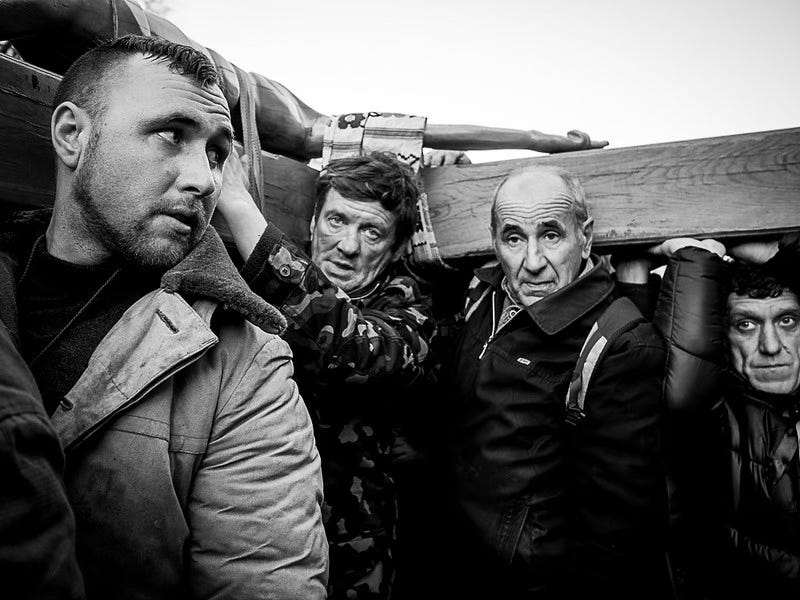
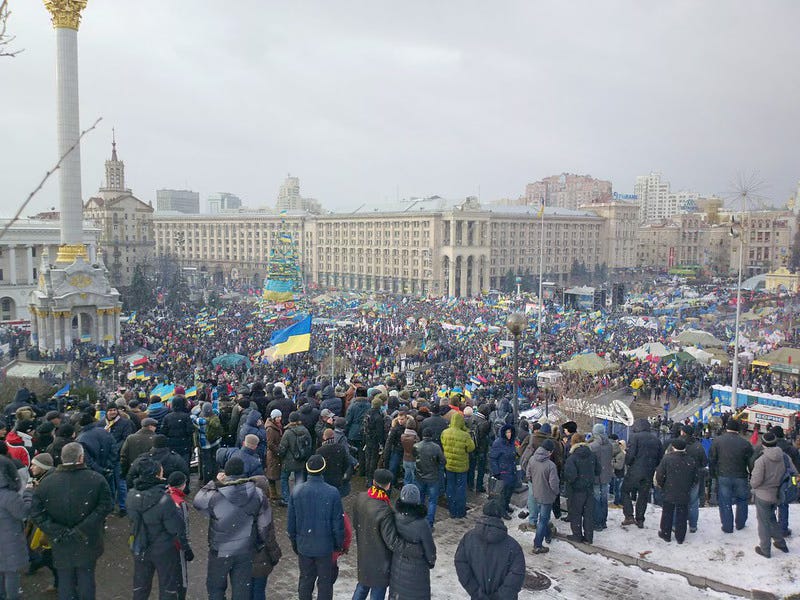
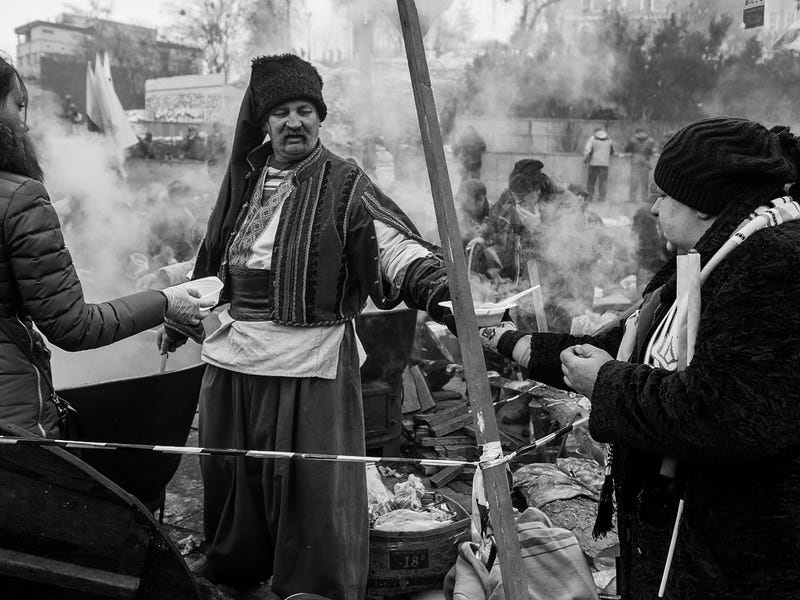
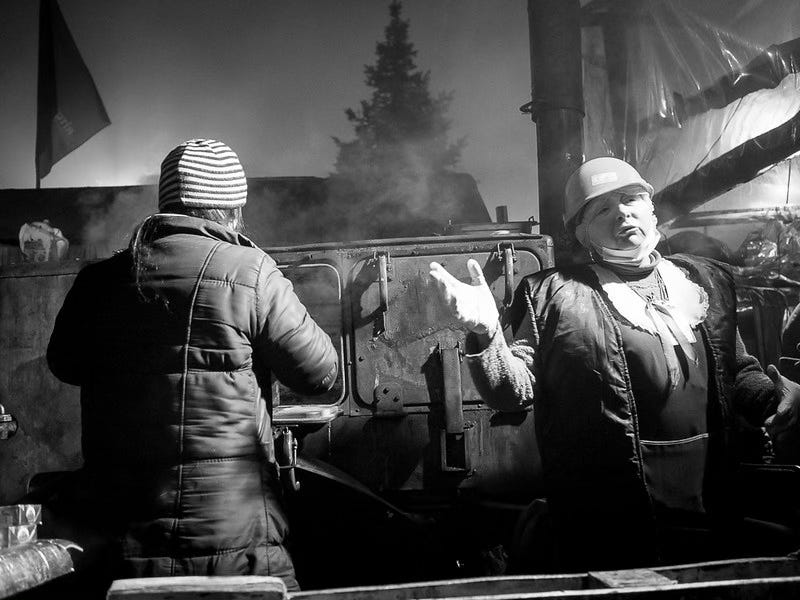
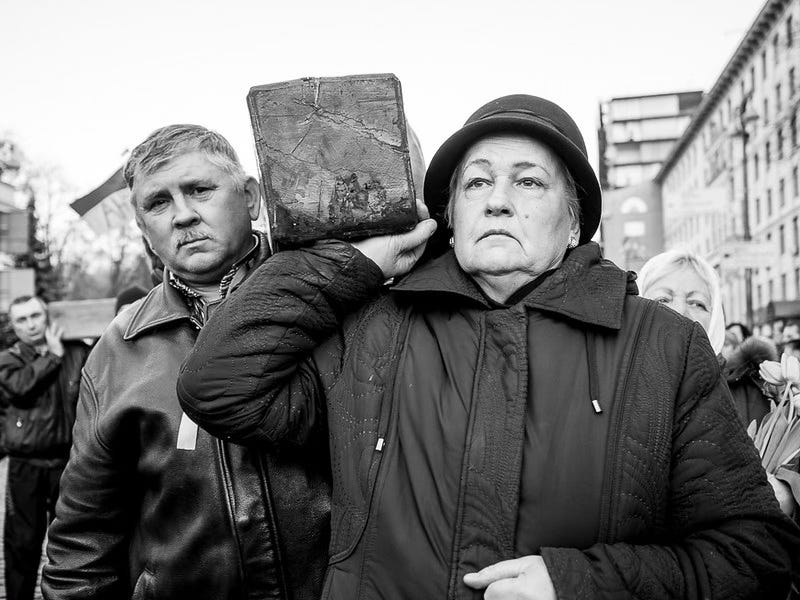
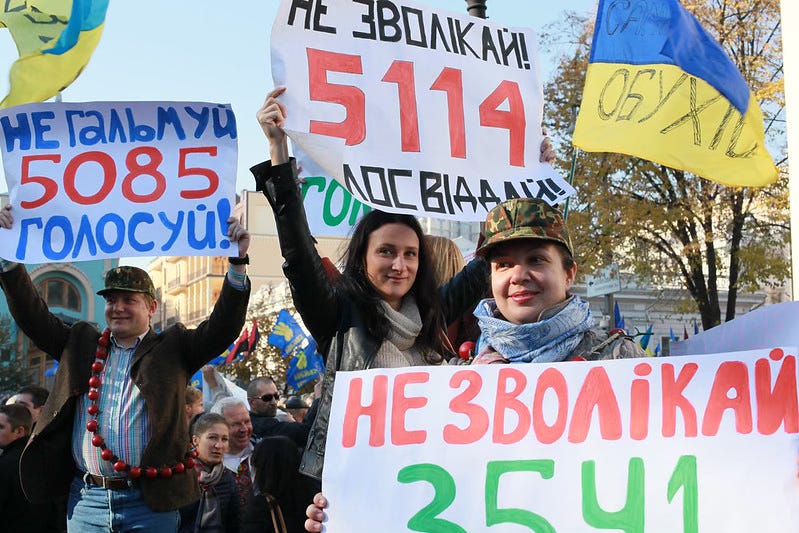
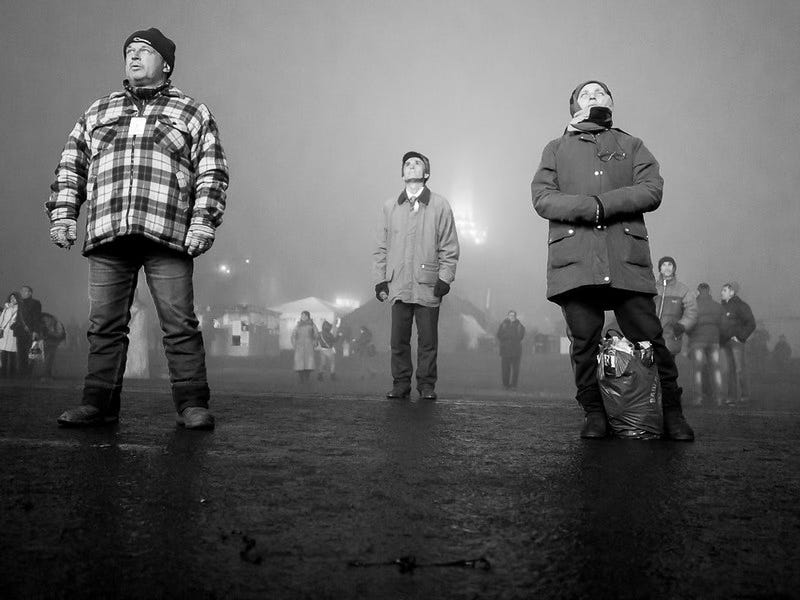
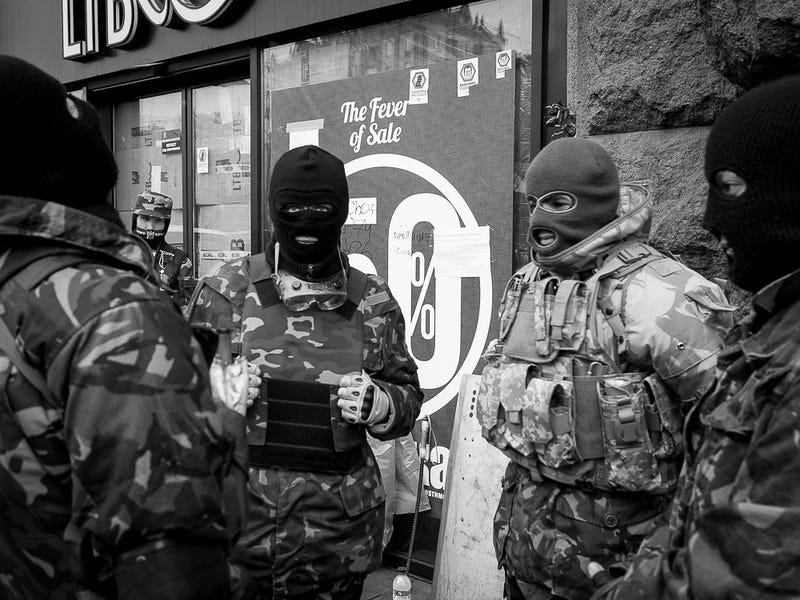
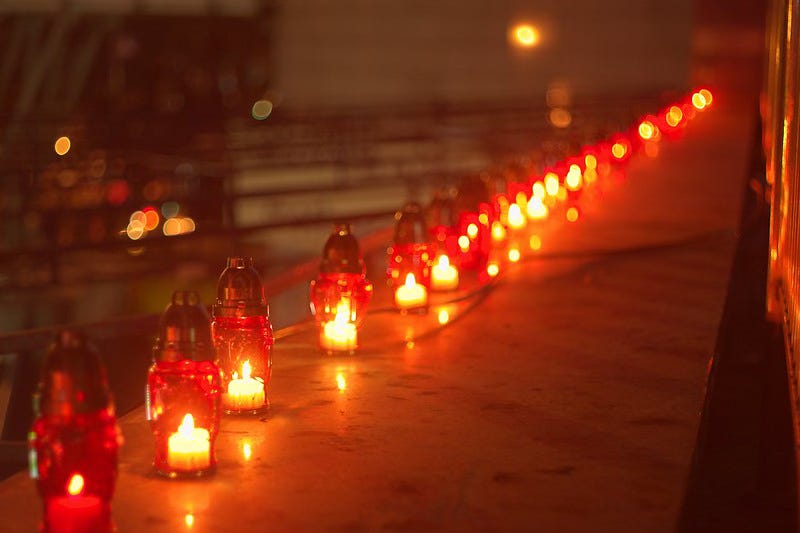
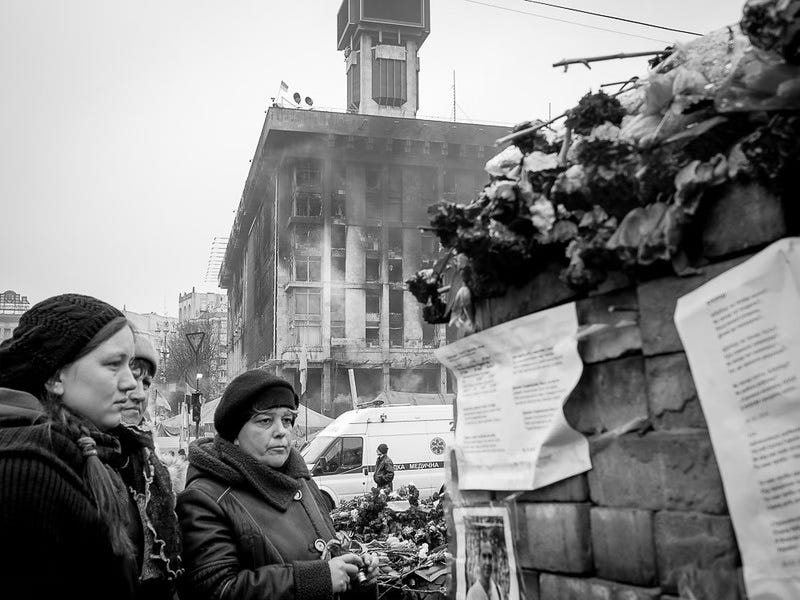
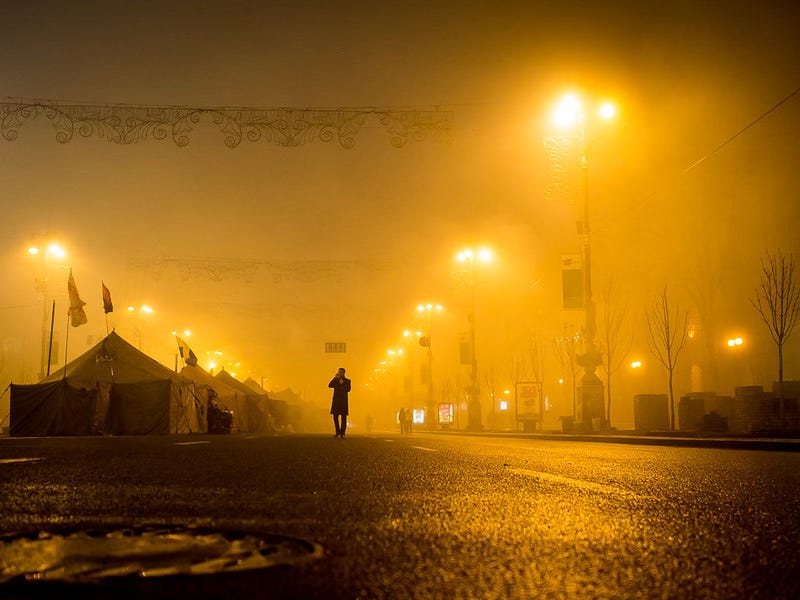
Bryce, thanks for the deep dive into the Maidan Revolution. It speaks to me of the need to pay attention to culture, not just political moves. Steve Bannon is the dark side of this phenomenon. His theory is that politics is downstream of culture. So he created alternatives to democratic culture and alternative media. Through fear mongering and lies and deception, he and Brietbart shifted millions of people into a culture of resentment and anger to be used for power. Our work must now be to create the culture of the values we believe in, that love, truth and beauty are the way forward for humanity. Yes, spirituality must guide us to create new public space.
A wonderful post describing that rare, practically indescribable thing--public happiness. (Arendt wrote about it, I believe.)